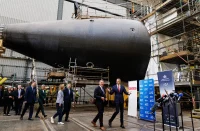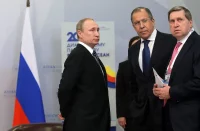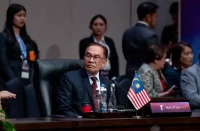December 15 Prime Minister of India Doctor Manmohan Singh starts an official visit to Russia.
As assumed the nature of business is to be emphasized: the leaders of two countries are to sign a number of agreements of long term nature. Further extension of cooperation in the field of nuclear energy (energy security tops the strategic priorities list for our Indian partners), working out a military- technical cooperation long term concept (an issue of special importance against the backdrop of the present difficulties attracting wide public attention), and, at last, going back to long duration wide scale foreign policy cooperation – these are the issues special attention is to be paid to.
As logic suggests steady advance along the road map of the economic ties development is to make an increase of bilateral trade up to USD 20 billion by 2015-2016 a possibility. It’s not the right time to compare the scale of our economic ties with India and the same figures in the case of China, things like commodity exchange, services, expertise and technology. As well as it’s not the time to put blame on the twists and turns of the “the Yeltsin era” concerning the Russia-India relations (it brought us substantial damage in India and the whole East).
In the case of separate issues, that is working on significant bilateral projects, we constantly encounter the problems of common nature, the long term concept (strategy) of Russian – Indian relations still being non-elaborated. This kind of concept, as is well-known, did exist in the days of the Soviet Union. Talking about the joint Soviet – Indian strategic concept implementation it was possible for the agents of the parties to make precise what their roles and missions were. The thing the Russia-India cooperation needs at most now is introduction of elements of planning into this complex, multi-faceted, “multi- phased” process, minimizing the impulses of spontaneity influencing the bilateral ties.
While developing economic ties with India, the Russian side should keep in mind the fact that the whole civilized world puts to use the tools of planning in strategic, indicative form. In concrete terms it means the Russian state (meaning its corresponding institutions and agencies) singles out a few the most promising – from advanced point of view of world productive forces – projects and technologies, providing priority support the way innovations would be given incentives to.
One of the projects mentioned above is the fifth generation fighter production, the idea behind it is to make a number of national production clusters “catch up” at once to the world level of Science and Technology that is so important to be reached by the whole national economy.
External economic ties are a powerful stimulator facilitating internal changes on the way of Russia’s economic modernization. By boosting cooperation with India, as well as with China, Brazil, Indonesia, Iran and other new influentials, Russia can give a strong impulse to its own progress. Even that is enough to make the Indian Prime Minister’s Moscow visit an event of extraordinary importance.
The strong side of our relations with India was initially based on organic unity of economics and policy. It’s a pity that recently we have seen the emergence of political problems, that the Russian side tactfully calls wrinkles. I think it all started 10-12 years ago.
At the time of the V. Putin’s first visit to India at the beginning of October 2000, I had a chance to take part in an international academic conference devoted to the Asia-Pacific region. The conference took place in Delhi under the aegis of an influential Indian Council for Social Science Research. It was hard to ignore the active participation of those who represented the Indian community in the USA, saying America was the major strategic ally of India. Back then I thought this kind of “non-academic” démarche was a purposeful effort on the part of some belonging to the Indian elite to fix new foreign policy guidelines of «the world’s largest democracy». Probably as an India scholar with some experience in the field I am too prone to suspicions.But right now I have a growing solid conviction that there is ongoing deviation from “the Nehru policy course ” and if we still see ourselves as friends the problems of “delicate nature” should be discussed in a candid way.
Really, isn’t it that we witness gradual refusal of the idea of multipolar world? Isn’t it that the Indian foreign policy establishment (or its influential fraction) uses vigorous economic progress of China as ideological justification of its going away from independent orientation in the world space? It’s not an idle question. Here’s why.
India has always been unswerving in its determination to strengthen security in the region the Americans call “Greater Central Asia”. The geopolitical space comprises: Central Asia, South Asia plus Afghanistan and Iran. Until recently Delhi had been a strong advocate of the idea that the very countries of the region were to be responsible for finding solutions to the complex regional problems.
Moreover the approach capped the logical climax in relation to the Afghanistan situation settlement at the time Beijing continued to rely on the UN Security Council authority. It seems to me these days the Indian approach has gone through a hard to explain metamorphosis: the Indian diplomacy kind of supported the US idea of the “new silk road” at the recent Istanbul (November 2, 2011) forum. The covert gist behind the idea is the preservation of “balancing” clout of outer region forces in “Greater Central Asia”. Naturally a question pops up: who the so called outer region forces are going to create a balance against (China, Russia) and, considering the given geopolitical activities, what strategic role India is to play?
Going further it is increasingly often Asian (and quiet often world) media outlets tell readers about a wide scale “rearmament” and armed forces modernization programme of India. There is no question concerning the idea of such modernization itself, especially taking into account the recent actions taken by the West in the Arab Middle East that imperil the very balance of the existing system of international relations and boost arms race. Diversifying sources of getting defense hardware and materials is a thing that could be justified. But there is another angle of view.
First, the reanimation of the “four democracies alliance” (USA, Japan, Australia, India) concept through US-Japan-India “strategic dialogue” at the initial phase starts to be a matter of serious concern for China that defines it no otherwise then “Eastern NATO”.
Some Chinese political scholars already advice their government to “respond” by intensifying foreign policy efforts, including boosting external economic ties in South Asia, a region sensitive for India.
Second, certain trends among some representatives of the Indian foreign policy establishment bring to mind a political imperative defined sometime by Prime Minister Manmohan Singh: the next ten years the economic rate of growth of the country should not be under 9%. (let me add it: taking into account the complexity of internal situation, including increase of youth cohorts – that is the number of young people under 35 years old making up for 70% of the whole population, the economic growth of the country shouldn’t be less than 7% at least). How can you combine no alternative to robust economic growth and intensive rearmament under the present conditions in India – that’s the question that still has no convincing answer.
Third, the new trends in foreign policy thinking of some who make part of the Indian elite evoke justified perplexity among those of the Russian upper circles, who see Russia’s place in the world based on multivector diplomacy concept. Putting it in simple words this trajectory of thinking may be defined as: “Love cannot be forced”. If the USA is the main friend, partner and ally for India, then we’ll intensify relationship with China.
All the more, as this way of thinking advocates see it, the Celestial Empire has no less problems in comparison with Russia and joining efforts of the two superlarge entities may engender a “multiplying effect” for Russia’s development.
Someone I know from the Ministry of Foreign Affairs tried to get an insight into the logic of the Indian partners concerning the policy towards the Shanghai Cooperation Organization. He told me in a confidential way: “No way I can understand our Indian colleagues. We do everything to meet them halfway, but somehow they kind of mildly push us aside. Perhaps they have already done their strategic choice in the US favour?” To tell you the truth I couldn’t tell the diplomat otherwise. Perhaps, in view of the fact that not all our initiatives related to the Indian foreign policy direction are understood, Russia should have a pause to give the colleagues in Delhi time while going ahead in developing relations with China and South Asia to satisfy our own strategic interests.
I think the vitality of the “Nehru” course is explained by the fact that the first Indian Prime Minister always had it his way and defended his, that is Indian interests. As time shows only this kind of “a game” can make you win. Perhaps this thought was invisibly present in the text of the recent birthday greetings of the Russian President to Sonya Gandhi, leader of the Indian National Congress.
But “the Nehru course” is not only a foreign policy success. As one of contemporary leading world economists Indian Sukhamoy Chakravarty noticed once “the Nehru course” is a long term strategy of social and economic progress. And its fundamental principles make possible constant perfection of instruments to influence the society making it more perceptive towards modernization. I would add: constant aspiration for transformation of the complex, to great degree polarized society has made the Indian economic school a world leader. A critical look at the experience gathered by our Indian colleagues may become a major component of our relationship.
_____________________
Prof. Andrei VOLODIN is the Ph.D.(History), Professor of the Russian Diplomatic Academy, Moscow.
Source: Strategic Culture Foundation














Comments